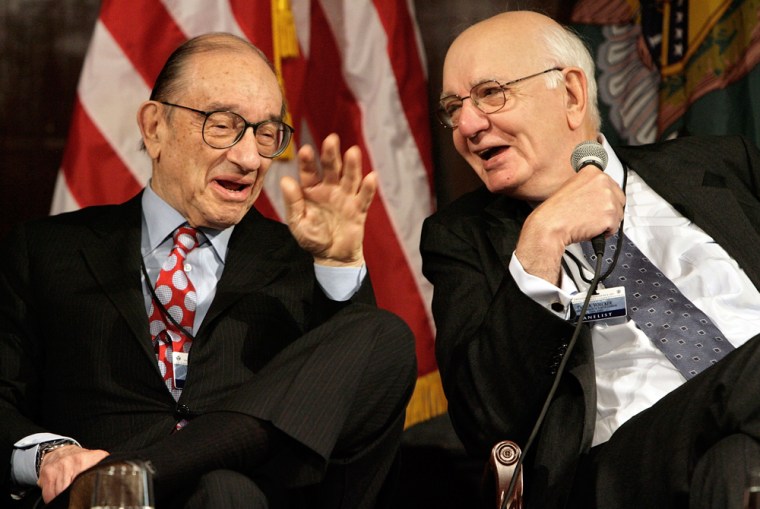The more Alan Greenspan whines about his tarnished legacy since leaving the helm of the Federal Reserve, the more his predecessor Paul Volcker looks to claim the title as the “greatest central banker who ever lived.”
That’s what Greenspan was hailed as in 2005, when the economy was booming and inflation remained low. Economists lauded his significant contributions during his 18-year Fed tenure, which included making the central bank more communicative and weathering two recessions.
Those accolades largely overshadowed Volcker’s achievements. He left the Fed in 1987 after an 8-year run of steering the economy through a tough battle against double-digit gains in inflation and a punishing economic decline.
Volcker’s legacy seems to be soaring now, while Greenspan’s is sinking — despite his intense effort to shift blame away from himself as the cause of today’s punishing financial crisis.
In an interesting juxtaposition of events in recent days, the two former Fed chairmen collided in the headlines. Greenspan, who left Fed two years ago, took to print and television media to defend his battered reputation. Volcker, in two rare, back-to-back speeches, gave a critical assessment of the current economy and the Fed’s role in creating and managing the crisis.
Their styles have always contrasted, now and when they were at the Fed. Economists say Greenspan is as much a politician as he is a policymaker — always looking for opportunities to claim the spotlight — a tactic that maybe hindering, rather helping his reputation now. It’s just the opposite for Volcker.
Once upon a time, Greenspan’s monetary policies and lax approach to regulation won him praise, not criticism. An academic paper written in 2005 said he had a legitimate claim to being the “greatest” central banker ever and touted his “magic formula” — where discretion rather than rules went into the Fed’s decision making.
But now, in the midst of today’s financial market turmoil and economic downturn, Greenspan — who was knighted by Britain for his achievements — is finding his legacy being called into question.
Critics say he kept interest rates too low for too long, fueling the housing bubble. They also charge he encouraged Americans to load up on leverage, ignored warnings on risky mortgage lending and didn’t properly monitor financial institutions.
“He urged people to borrow against their homes because it would help fuel the economy,” said Robert Brusca, who heads the independent research firm Fact and Opinion Economics. “I can’t imagine a more outrageous thing for a Fed chairman to do.”
Greenspan has been on the defensive for months over such attacks, but in recent days, he has stepped up his fight against them. Through comments in the Financial Times, Wall Street Journal and CNBC, he laid out a case for why he didn’t do anything wrong.
“I have no regrets on any of the Federal Reserve policies that we initiated back then, because I think they were very professionally done,” Greenspan told CNBC on Tuesday.
But it’s hard to buy that “don’t blame me” argument, given the current economic predicament. Paul Kasriel, who directs economic research at The Northern Trust Co., says the facts speak for themselves.
For instance, he notes that households in 2005 spent $531 billion more than they earned after taxes, compared with the surplus of earnings over spending of $108 billion seen in 1987 when Greenspan took over at the Fed. And while leverage has surged to record highs, household liquidity has sunk to near record lows of around 9.5 percent in 2005 from 14.2 percent in 1987.
“Greenspan’s argument that it was not his doing that set off the U.S. housing bubble reminds me of my two perfect children,” Kasriel said. “When they appear to err, it was never their fault.”
The more Greenspan tries to spin his legacy in his favor, the less it looks likely to happen. The public is growing numb to his attempts to pin the makings of this crisis on others.
That may be why the attention shifted to Volcker in recent days. He never sought publicity after he left the Fed; he expressed his views occasionally on the state of the economy or monetary policy.
This week was an exception. During two speaking engagements on Tuesday and Wednesday that were closely watched, Volcker didn’t sugarcoat his assessment of the roots of the current financial crisis — whereby “complexity, opaqueness and systematic risks” were embedded in new markets — and the policies now being used to clean it up.
“Simply stated, the bright new financial system, for all its talented participants, for all its rich rewards, has failed the test of the market place,” Volcker said during a speech Tuesday to the Economic Club of New York. “What has plainly been at risk is a disorderly unraveling of the mutual trust among respected market participants upon which any strong and efficient financial system must rest.”
Those comments drowned out Greenspan’s woes. And with them, Volcker began to reclaim the praise and recognition he deserves.
